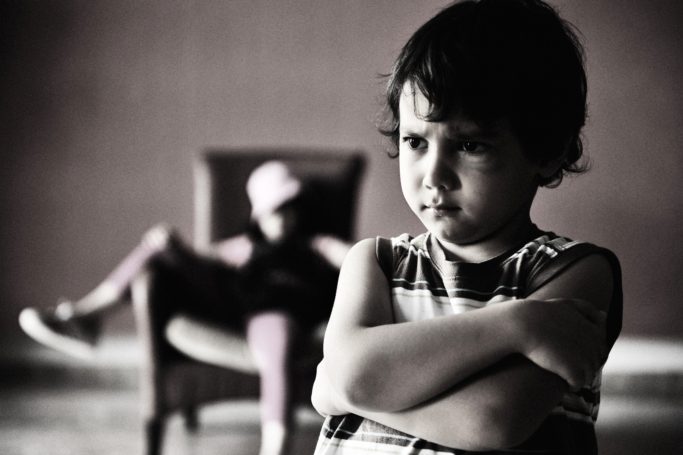Kids Need Mental Health Days- 9 Misconceptions That Need to Change
Inside: Learn the most common reasons parents won’t allow their child to take a mental health day and why they need to consider changing their mind.
How about a quick game of ‘Would You Rather?’
If you needed to take a sick day at work and had to choose one of the following reasons to explain your absence, which would you rather use?
- I’m giving myself a mental health day or
- I’ve been stricken down by a horrible case of diarrhea.
If, after some genuine contemplation, you’re surprised to find yourself leaning towards option B, it turns out you’re not alone.
Recently, I asked the parents in my online community if they currently offered their child mental health days (and why or why not), and my friend responded with this exact story.
She’d called in to ask a colleague to please mention to her supervisor, upon their arrival, that she’d be taking a mental health day.
To which her colleague quickly responded, “Are you sure you wouldn’t rather I tell him you have a bad case of diarrhea or something?”
It was impossible to ignore the message that echoed throughout this response and many others; mental health stigma is still alive and well when it comes to how we’re approaching the health and emotional well-being of the next generation.
I anticipated the responses I’d receive would be varied, but what I didn’t expect was the flood of emails with a very similar theme: No, I haven’t, and if I’m being honest, I would hesitate a bit to allow my child to stay at home for a mental health day.

Even more interesting, all of these parents agreed that, in theory, mental health days make complete sense, and mental health should be regarded with the same importance as physical health.
But when it came to applying the concept of a mental health day to their own child, there was a mental impasse. The question is, “Why?”
The parents in the Parents with Confidence online community (with the very mission of raising emotionally healthy children) generously offered their reasoning as to what gives them pause when it comes to mental health days, and it was clear that the hesitancies fell under 2 main categories, both of which are unsurprisingly underscored by the stale and stigmatizing views that continue to haunt the life-saving concept of mental health:
- Navigating real-world logistical hurdles such as limited ‘sick days’ from work and strict attendance policies in schools that stem from a lack of cultural support/awareness of mental health care.
- Fear and irrational thinking patterns about the unknown, related to the ‘uncharted waters’ of doing something out of the cultural norm.
Let’s take a deeper look at what might be holding you back from validating mental health days for your child, along with the reasons why thinking about the bigger picture of your child’s health and well-being in that way are flawed.
Reasons why parents avoid mental health days for their children
1.”What if my child starts thinking they can take days off whenever they want to?”
The idea of a child possibly ‘taking advantage’ was the most prevalent. Parents thought that if their child was allowed to take a day off for mental health, they’d run the risk of their child inappropriately requesting more days off in the future.
The flaw: It defaults to the unhelpful and untrue mindset that children are dishonest, sneaky, manipulative and don’t have the ability to genuinely reflect on their state of mind.
The best starting place to default in any endeavor with your child is always assuming the best of them.
::::: Want to teach your child to manage their emotions in healthy ways? Give your child the lifelong superpower of emotional regulation skills with the Calm Kids Set
2. “What will other people like teachers and coaches say?”
The people-pleasing tendency that so many of us picked up from our own childhoods is real.
I’m going to get vulnerable here and tell you that I, as a mental health professional of 15 years, have hesitated to offer my children mental health days because good lord I’d have to actually tell the people at school something they’re not used to hearing, and what if they judge me??
Even though I believe, in my SOUL, that good mental health is infinitely more important than academics.
Even though I pride myself on putting my child’s emotional well-being above most all else.
Even though I know that if my child’s amygdala (the emotional center of the brain) is in overdrive, they won’t be able to access much of the higher thinking part of the brain they need for school anyhow.
The flaw: Others’ opinions of you are being prioritized over your child’s health and well-being.
Changing old habits and patterns of thinking is HARD, but the ability to do just that is what makes us uniquely human.
3. “What if taking a mental health day off teaches my child to avoid their problems and challenges?”
Many parents responded to the idea of giving their child a mental health day with the fear that it could lead to a habit of avoidance.
The flaw: Ideally, the child takes time away from regular responsibilities to think about and reflect on their current thoughts and emotions, thereby providing the opportunity to confront the challenges weighing them down, and move forward in a better place.
A day off simply pulls them out of survival mode and gives them permission and space to slow down and turn inward.

4. “What would we even do to make a mental health day ‘worth it’?”
The idea that taking the day away from regular responsibility wouldn’t be ‘enough’ was another parent concern. “I wouldn’t know what to do.”
The flaw: This fear-based thinking likely stems from the inexperience we have as a culture with offering time and prioritization of mental health as well as our constant glorification of productivity.
In many cases doing nothing at all and stepping away from the stressors of daily life is actually all that’s needed to get back to a baseline of emotional regulation.
5. “What if taking the day off for mental health doesn’t make them feel better?”
The human mind is not a big fan of uncertainty. We’d like to know the answer and the outcome, and we’d like to know that now, thank you very much.
When things feel out of our control, we shy away from them. You can control taking your child to school, but controlling their mental health and state of mind?? …not so much.
The flaw: There is no proof that a mental health day will provide any given outcome you’d like to see.
Instead of trying to control the outcome and speculate on the future, let’s meet our children where they’re at right at this moment, and do the right thing for them in the here and now.
6. “My child would get even more overwhelmed having to make up for the work they missed.”
After recently pulling my older children out of school for a week to take a family trip, this one hits home. Missed schoolwork can equal added stress.
The flaw: A day’s worth of make-up work is not going to make or break your child’s stress level, whereas not taking a day off when it is fully needed may in fact do just that.
Related Read:: 7 Surefire Signs your Child Needs a Mental Health Day
7. “My spouse doesn’t support anything related to mental health and would think it was ridiculous.”
Sadly, I believe this response is probably more common than many of us would like to admit.
The flaw: When we fear the unknown and don’t take the time to gain an understanding of issues that don’t directly affect us, it has a negative ripple effect.
It can make it harder for our culture to progress in the consideration and treatment of mental health conditions as well as the regard we have for our mental health in general.
When we know better, we can do better. This is the perfect situation to open a respectful dialogue on the topic of mental health with a partner and take the opportunity to explore its meaning and importance together.
8. “I don’t have enough sick days at my place of employment to take extra days off.”
There are many stresses that modern parents have to contend with today, and the cultural constraint of rigid paid/unpaid time off policies in the workplace is a very real one.
Sick leave for employees varies based on the country and, on top of that, geographical areas within each country. But overall, sick leave, vacation time, and parental leave benefits are considerably lacking in the US in comparison to other developed countries.
The major flaw: When companies and institutions continue to prioritize productivity and financial gain over the quality of life and well-being initiatives for their employees, they’ll continue to discourage the prioritization of emotional well-being and mental health in our society.
While some progressive companies are indeed beginning to pave a path toward prioritizing mental and emotional well-being through company incentives and more flexible time-off policies, a clear takeaway is that at a minimum, we need to start having discussions on the prioritization of mental health in both public and private sectors of business.
(Clearly, this is a complex and loaded question with many systems and layers involved, and this discussion merely offers a very general jumping-off point.)
9. “What if my child doesn’t talk, and we don’t get anything figured out?”
Just to be safe, expect that your child won’t be able to ‘figure it all out during the course of one mental health day off from school.
While it may be helpful or come naturally for some children to work through their stresses verbally, others will prefer different outlets for their emotions and stress such as art, nature, journaling, exercise, etc.

The major flaw: Here’s that ugly control monster rearing its head again.
You can control the tone of the physical environment your child is in by creating a supportive and responsive atmosphere through questions and dialogue, you cannot control what your child tells you and if or when they tell you anything at all.
For example, “You seem stressed, what’s up?”, “I’m here to talk whenever you need” and “A lot of times, talking helps to feel better and figure out the next steps to move forward” are all great ways to control the dialogue on your end. Then be quiet, wait, and if they decided to share listen, listen, listen.
All is not lost if your child doesn’t open up at that very moment. The gift of consistently giving your child the space to do so when they’re ready is everything.
It’s time to normalize mental health days for kids (and everyone while we’re at it).
We can all agree that some of these parent viewpoints are understandable and even unavoidable.
More so than ever in the past year, mental health is a topic finally getting its due recognition.
Sadly, this has come in the form of the continued decline (if you thought it was ‘good’ before the pandemic, you’d be incorrect) of good mental health in our youth.
The grim statistics on anxiety, depression and suicide in our youth continue to beckon us to open our minds to new approaches towards our children’s mental and emotional health.
Here are just some of the many questions it would behoove us to start asking in our families and communities…
Why did it take a global pandemic and economic crisis to open the door to vital discussions around mental health?
Can a society without bigger systems onboard to accommodate good mental healthcare truly expect to see concerning statistics of mental health conditions decline?
What factors play into a society undervaluing mental and emotional health and where might small shifts in these mindsets be made in our own family?
What are the factors that have historically given mental health a ‘backseat’ to physical health? (Lack of research? Lack of clear physically visible symtoms?)
Let’s be honest, parents reading this post are likely more progressive than the general public in regards to the topic of mental health.
How and where can those of us that are already invested, start having meaningful discussions about the value of our children’s mental health?
Long-lasting positive change doesn’t happen overnight, but with small intentional actions.
My hope is that, together, we can start sending out small, yet powerful, ripples of action into the systems intertwined in everyday life, so that not only our children, but the children of future generations will have a better quality of life.
*Because of the broad scope and nature of the topic of mental health days for children, this post is the first in a series of four
Want to Raise an Emotionally Healthy Child that will thrive out in the world? I created a free 5-day parenting course just for you! (sign up below)
Other parenting articles you’d love:
75 Awesome Calm Down Strategies for Kids (that they’ll actually want to try!)
The Best Mindset for Parenting a spirited Emotionally Intense Child
10 Insights of Remarkable Parents from a Family Therapist
Easy Ways to Bond With Your Child (even when there’s no time in the day)








